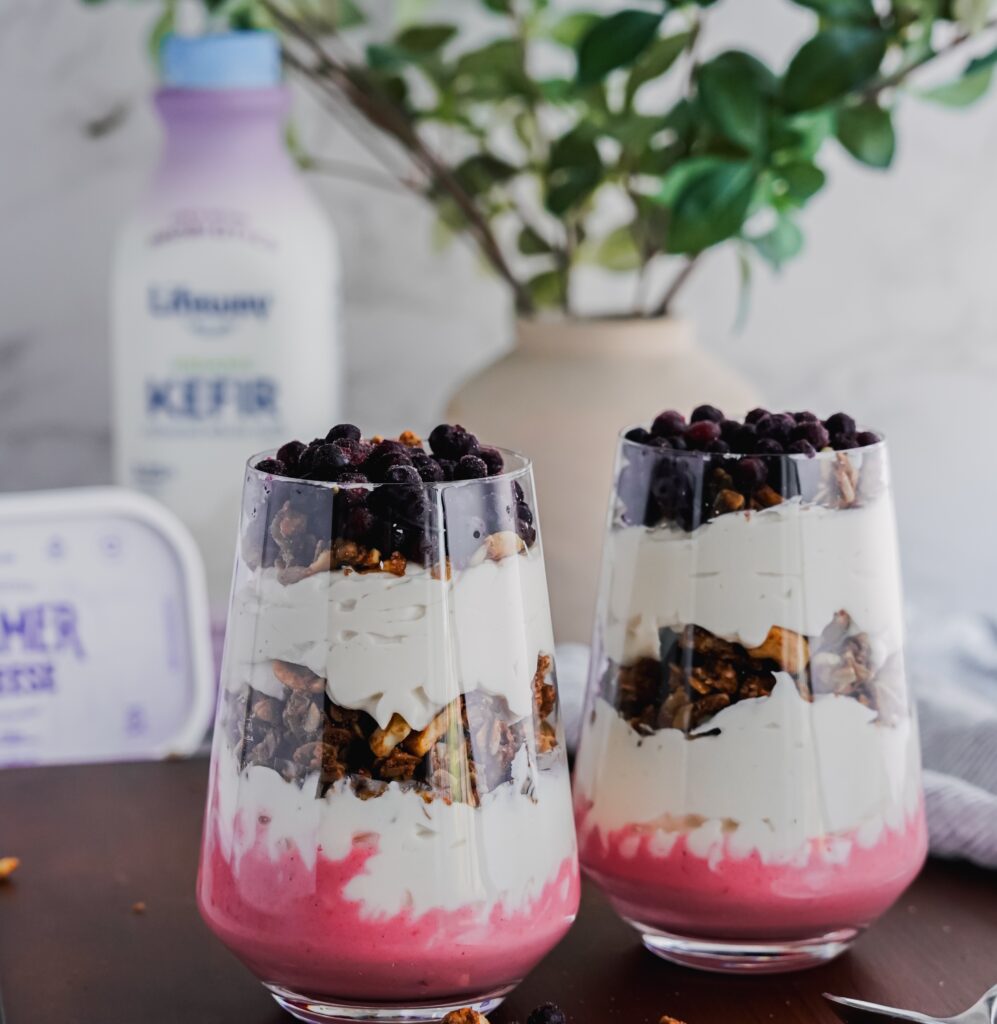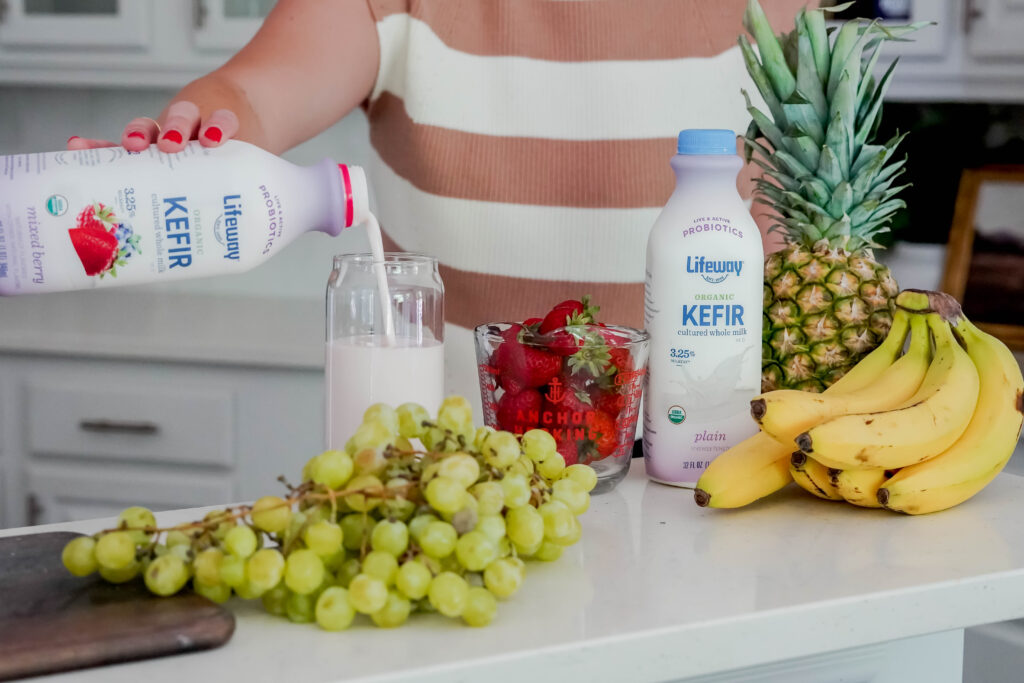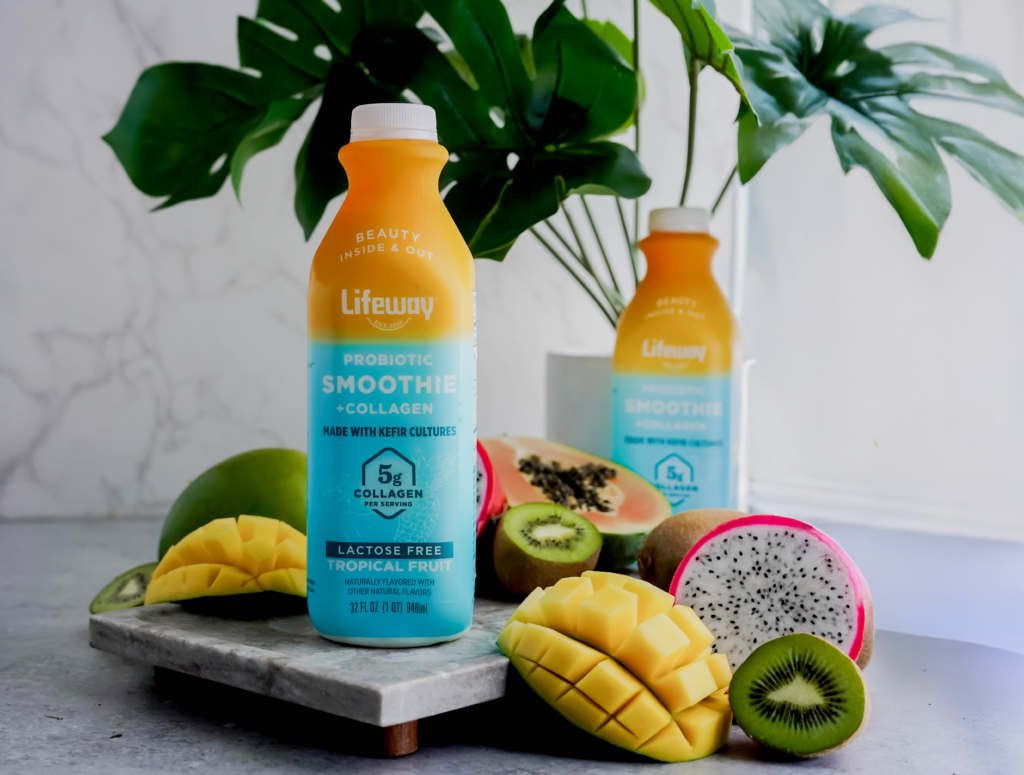GLP-1 medications have taken off rapidly and are increasing in use as individuals continue seeking an easier way to control hunger and cravings. These medications are well-known for their use in the treatment of diabetes and obesity due to the way they lower blood sugar levels, however, you may not know that our bodies release GLP-1 naturally when certain food choices are eaten. That’s right: your body already makes GLP-1 and you may not even know it! The same response the drugs provide is a natural process all of our bodies perform on their own—if we’re strategic with our food choices.
We’re here to help clear the air on what GLP-1 is and share information so you can stay empowered whether you’re looking to utilize this natural process on your own, or if you’re on a GLP-1 and need support mitigating the side effects and ensuring you get enough nutrients.
What is GLP-1?
GLP-1 stands for Glucagon-Like Peptide. This is a natural peptide hormone our bodies make on their own that is secreted when we eat foods high in protein and fiber. Our bodies have natural GLP-1 receptors in the gut and in the brain that acts as the reminder in our brains that tells us to stop eating when our gut signals we’ve had enough and that we’re full. GLP-1 drugs also lower blood sugar levels and slow gastric emptying which reduces hunger to levels that cause natural caloric restriction and thus, weight loss.
How to Eat to Support Your Body’s Natural GLP-1 Production with Food Choices:
Foods higher in protein, like Lifeway Kefir, provide an easy, healthy, bioavailable source of protein that our bodies can use to lower blood sugar levels and reduce hunger naturally. This triggers GLP-1 because protein-rich foods naturally turn off the hunger signals due to the way protein reduces ghrelin (the hunger hormone) in the body. Protein-rich foods also lowers insulin in the blood stream so our blood sugar levels are more stable. Fiber also triggers GLP-1 by slowing gastric emptying since it digests slower. This also means you can enhance your body’s own natural GLP-1 process by eating foods high in protein, like Lifeway Kefir, along with fiber-rich foods daily.

Kefir is a unique food that has huge value for people to support GLP-1 production due to the protein, probiotics, and metabolites it contains. Kefir’s protein and nutrients stimulate postprandial GLP-1 release, while probiotics and bioactive peptides influence the integrity of the gut barrier to increase the production of butyrate levels (short chain fatty acids). This boosts GLP-1 secretion in the gut, which reduces blood sugar, appetite and inflammation levels. Kefir’s probiotics also work to lower blood sugar levels and support healthier levels of hormones in the body that affect weight, blood sugar, and hunger levels—including GLP-1. This makes kefir an important source of protein and probiotics due to the way kefir works with our bodies’ own natural processes to enhance the satisfaction response, trigger GLP-1 levels, and lower blood sugar levels.
Read more below about how Lifeway Kefir and other foods higher in protein and fiber support your body’s natural GLP-1 production, and how they can help even reduce side effects if your health care provider has you on a GLP-1 medication.
How to Mitigate Side Effects from GLP-1 Medications: GI Upset and Muscle Loss
The complete list of side effects of GLP-1 drugs is still ongoing, however, one that’s spoken about most often is gastrointestinal side effects. Many people complain of GI upset which can occur for several possible reasons. One, patients may be new to GLP-1 medications and are slowly adjusting or they may be on too high of a dose too fast. Many patients on the drugs may also not be eating properly since it’s important to eat foods high in protein and fiber. Nausea, vomiting, diarrhea, and/or constipation are all common complaints of GLP-1 drugs due to slow gastric emptying.
Another important side effect to consider on GLP-1 agonists is substantial muscle loss due to rapid weight loss, which doesn’t distinguish between losing fat or muscle. Prioritizing getting enough protein each day from foods is critically important since this will preserve muscle wasting and give the body what it needs to lose weight while preserving muscle. When weight loss occurs, our bodies naturally pull from muscle first—not fat— so eating enough protein and strength-training (resistance training) are both vital to prevent as much of this from happening as possible.
None of these side effects are experienced when GLP-1 is triggered naturally on its own when we eat foods high in protein and fiber. This is one reason being strategic with our dietary choices is key for supporting our bodies’ natural GLP-1 production without worrying about any negative side effects. Make sure you get enough of them each day by looking at your plate/bowl at each meal (or whatever you’re eating/drinking) and making it a goal to include both protein and fiber at each meal and snack.

How Lifeway Kefir Helps Support Gut Health While on GLP-1 Medications or Not
Lifeway Kefir is a protein-packed probiotic beverage that’s easy to consume on its own or mix into recipes. Our probiotic kefir is a wonderful way to support the microbiome, assist in digestion, and provide gut-health support for everyone, including those on GLP-1 agonists and other weight loss medications that can have similar side effects. The live probiotics in Lifeway Kefir provide soothing digestive benefits and can help in digestion and elimination. Enjoying Lifeway Kefir with foods high in fiber such as fruits, veggies, whole grains, nuts, and seeds, makes it an easy way to get protein and fiber into your day! This takes care of side effects of the drugs while also preserving muscle so you win all the way around.
Check out our recipes here to get perfect examples of how to enjoy Lifeway Kefir at meals and snacks that are rich in protein and fiber!

Dietary Tips From Lifeway’s Dietitian:
Our dietitian here at Lifeway, Caroline Margolis, R.D., also shared some of her best tips for those on GLP-1 medications. Keep these in mind for best results:
Important Things to Keep in Mind:
- Focus on quality, not quantity. Prioritize your plate with nutrient-rich foods that include a balanced diet of fruits, vegetables, lean proteins, dairy, nuts, seeds, and whole grains to ensure you get enough critical nutrients. Pay extra attention to nutrients like iron, calcium, vitamin D, and the B vitamins, which are the nutrients of concern and are found in natural whole foods.
- Protein, protein, protein. Because those on GLP-1 medications are at risk of losing lean muscle mass, prioritizing protein is a must. Make sure to consume 1-1.2 gram of protein per kg of body weight per day at a minimum.
- Consuming probiotic foods like Lifeway Kefir may help manage hunger and blood sugar levels because of their gut-health modulating benefits in regulating GLP-1 production. They also are bioavailable source of protein and valuable bone-building nutrients.
- Prioritize high-fiber foods, like fruits, vegetables, whole grains, nuts, seeds, and legumes to help mitigate the digestive side effects of slowed gastric emptying, and keep you regular. High processed, low-fiber foods can further increase chances of constipation, as well as contribute to malnutrition.
- Don’t Forget Hydration and Exercise – Move it or you lose it! Movement, especially weight-bearing exercise, will help prevent muscle loss and supports a strong body. Walking more and resistance training both go a long way to help you mitigate muscle loss and stay active. Hydration is also key to support your body’s fluid levels and to keep food moving through the body efficiently.
Find Lifeway Kefir at a store near you or shop online here to discover how Lifeway can help support your health goals this year. For more tips, be sure to subscribe to our newsletter at the bottom of our site, and stay up to date with us on social media as we help you #LoveYourGuts all year round!
